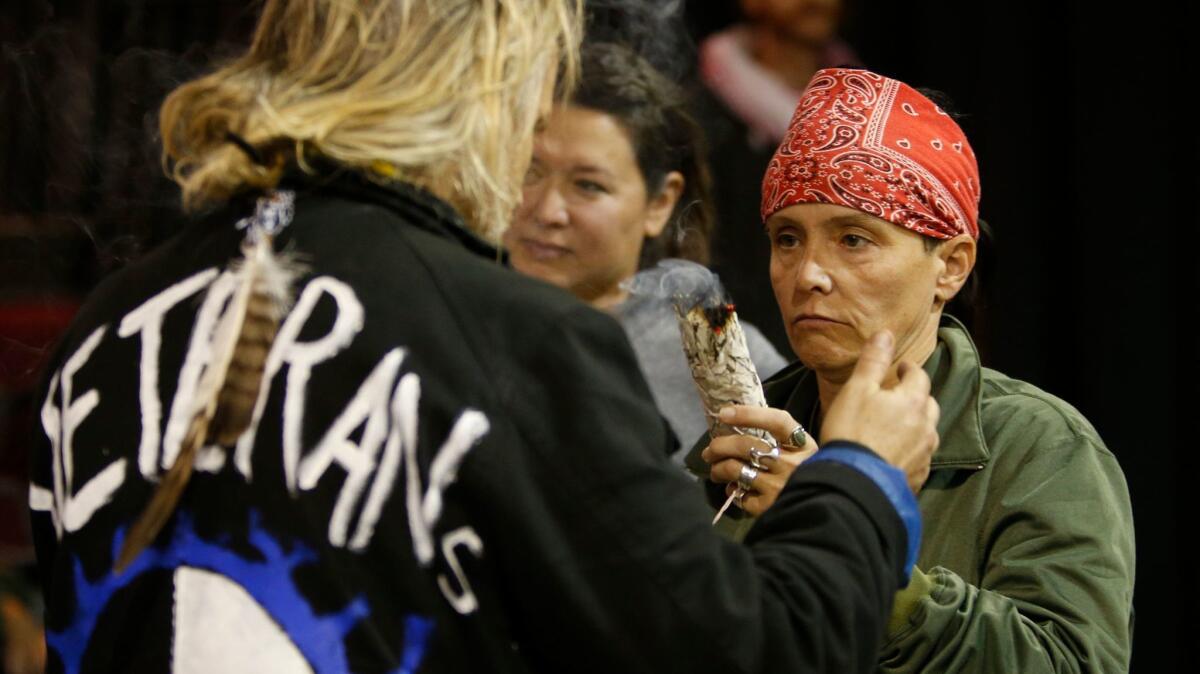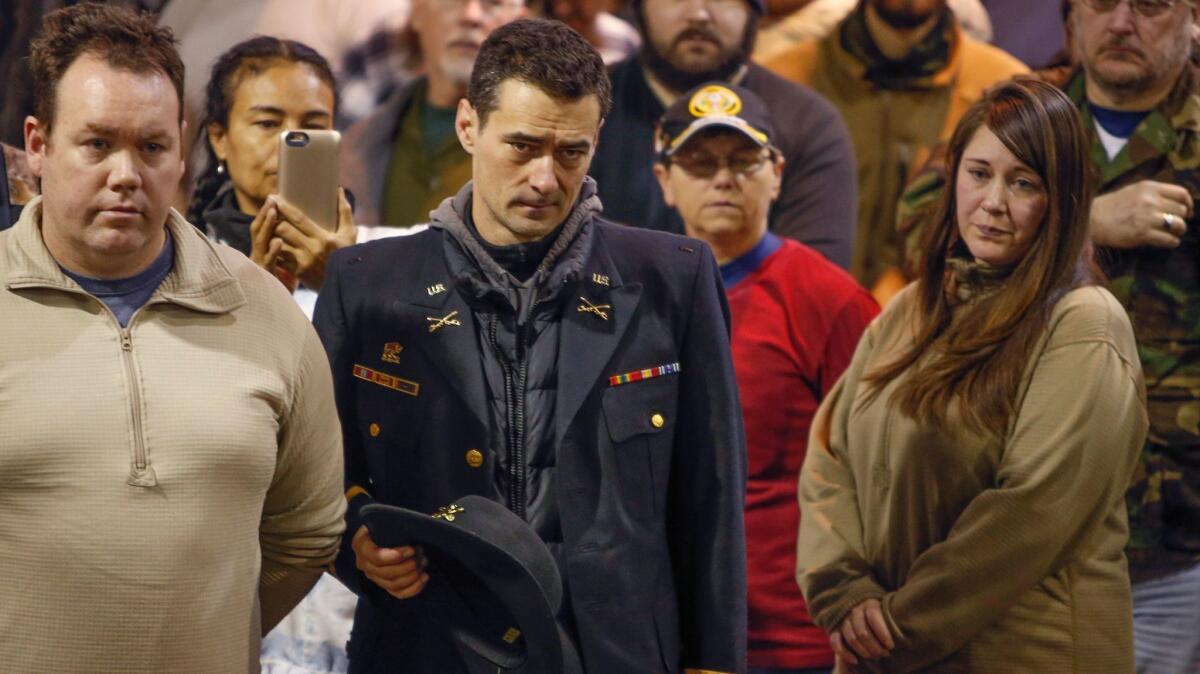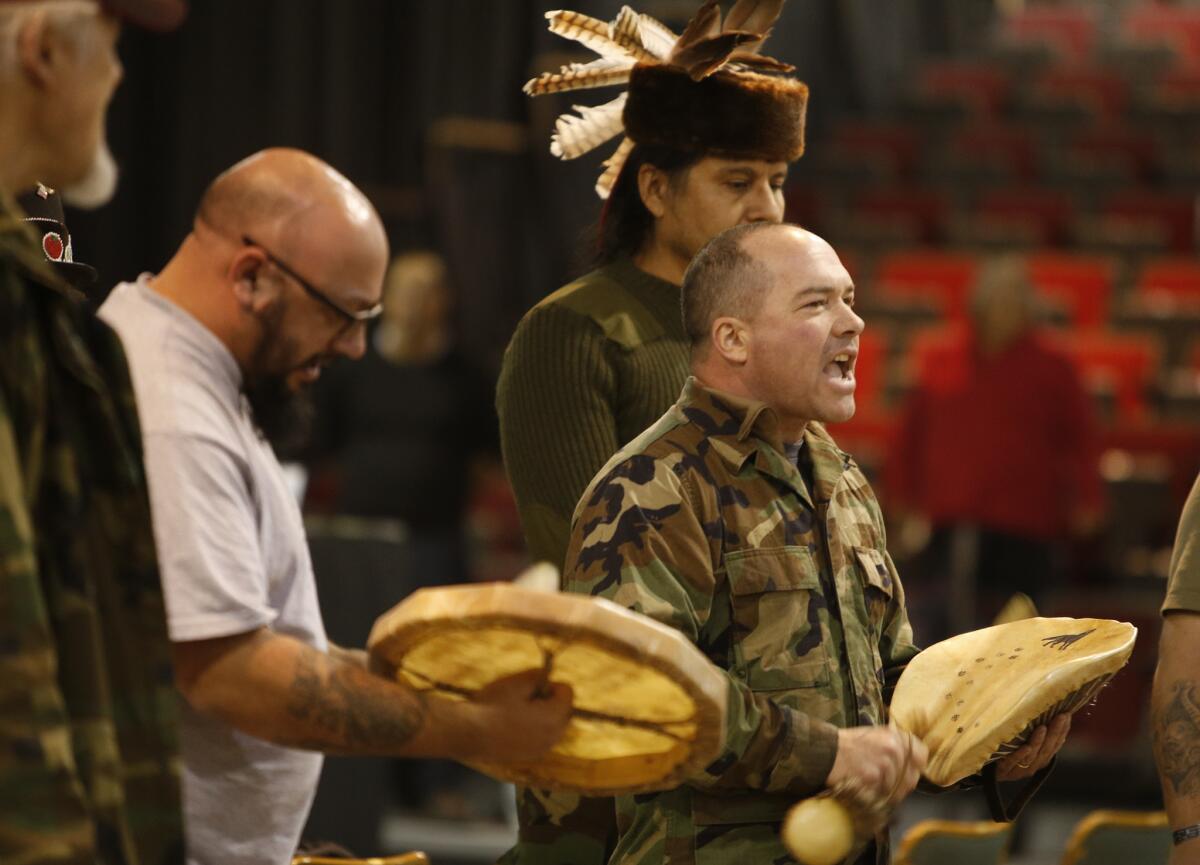Veterans came to North Dakota to protest a pipeline. But they also found healing and forgiveness

- Share via
Reporting from cannon ball, n.d. — They had come to join Native American tribes and environmentalists protesting an oil pipeline, fully expecting to endure tear gas and rubber bullets. But in the end, veterans who traveled to the Standing Rock Sioux Reservation found something far more profound.
Inside the auditorium at a reservation casino, Wes Clark Jr. and about a dozen veterans in formation behind him faced a small group of Sioux spiritual leaders. Encircling them, hundreds of other veterans looked on.
“We came. We fought you. We took your land. We signed treaties that we broke,” he said.
Clark, organizer of Veterans Stand with Standing Rock, noted that some of the veterans had served in the same military units that had fought during the Indian Wars. He wore the blue jacket and hat of the 19th century 7th Cavalry, evoking the 140-year-old memory of Gen. George Armstrong Custer. As it happened, he spoke on Custer’s birthday, Dec. 5.
“We stole minerals from your sacred hills,” Clark continued. “We blasted the faces of our presidents onto your sacred mountain. Then we took still more land, and then we took your children and we tried to eliminate your language. … We didn’t respect you. We polluted your Earth; we’ve hurt you in so many ways.”
Then Clark took off his hat, dark blue with gold braid, and lowered to one knee, as did the veterans behind him.
We’ve come to say that we are sorry. We are at your service, and we beg for your forgiveness
— Wes Clark Jr.
“We’ve come to say that we are sorry,” he said, bowing his head. “We are at your service, and we beg for your forgiveness.”
At a time when so much of the nation is divided by politics and ideology, the protest against the Dakota Access pipeline in North Dakota forged an unlikely coalition of veterans, Native Americans and environmentalists who produced an even more unlikely outcome.
In a surprise move, the Army Corps of Engineers announced Sunday that it had denied an easement for the pipeline to cross under a stretch of the Missouri River, at least until the corps issues an environmental impact statement. It was a temporary victory for the Standing Rock Sioux Tribe and the thousands of self-described “water protectors” who had camped out near the Cannonball River to protest the $3.8-billion, 1,170-mile pipeline that opponents derisively call “the black snake.”
Thousands of veterans, including Clark’s group, had joined the encampment just one day before the Army Corps’ announcement.
The idea for the forgiveness ceremony came to Clark a few weeks earlier, as he was preparing the “operations order” for the veterans’ mission. He wrote to Standing Rock elder Phyllis Young, a leader in the pipeline battle. “We wanted to make allies across the land,” Young said. “Wes represented the U.S. military, who has been our historic enemy, but we wanted to make peace for the benefit of all the people in the world.”
Clark had expected the ceremony to be outside, with a full regiment “with flags and bagpipes” arriving at the Sacred Fire at the main camp. But the coming snow and cold, and concerns for the welfare of some of the elders, forced the ceremony indoors.
Then on Monday, as a blizzard bore down on Standing Rock, Clark took a knee and bowed before Lakota medicine man Leonard Crow Dog. As smoke from the sacred bundle of cedar, sage and sweetgrass rose, Crow Dog gently placed his hand on Clark’s head. Someone let out a ululating cry, and fellow Sioux spiritual leaders offered prayers and songs of cleansing and forgiveness. Hardened veterans wept openly.
Then Clark and the other veterans, their faces twisted with emotion, began to embrace their Native American hosts. It was apparent that the former servicemen and -women received far more in the forgiveness than they gave in supplies and the goodwill they brought with them.

“To submit in that way and ask for forgiveness was really emotional,” said a Navajo U.S. Navy veteran who uses only one name, Remy. “Any time you bring these two cultures together, it has never worked in our favor. It was a small step in the right direction.”
On Thursday, the last of an estimated 4,000 veterans, twice the expected number, trickled out of Standing Rock to return to their lives. For many of them, the cleansing ceremony was the most visible of intimate encounters with the water protectors.
“The idea of shared suffering reinforces the fundamental principle of us all being in this together,” said Robert Chambers LeHeup, 35, of Columbia, S.C., a Marine veteran of Afghanistan whose battalion took the Kandahar airport in December 2001.
After leaving the Marines, LeHeup “became disillusioned, given the way that we treated some of the people. After I got out, I pretty much didn’t have anything worth fighting for. It was hard for me to comprehend something that was worth me dedicating time and effort in my life to do. And then I found out about this.”
On Wednesday afternoon, LeHeup stood amid dozens of cots in a converted gym in the town of Cannon Ball. He and fellow Marines arrived here in the wake of the brutal blizzard that blew over their tent at the Seven Council Fires camp a few miles north. He blamed the collapse in part on what he said was a poor, slap-dash preparation of the organizers of the veterans’ mission.
LeHeup conveyed his encounter in the gym with a Native American man, a total stranger who listened to his frustration at the “debacle of monumental proportions” during the blizzard. But it wasn’t just the tent. His anger, frustration and sadness rose to the surface.
As LeHeup’s emotions welled up, the man said softly, “Sacred tears.”
“And I wept like a child,” LeHeup said. “It’s going to take me weeks, if not months, to reconcile all of that. This guy doesn’t know me, and still he comforted me. It shows humanity on its most fundamental level. It gives hope, where I’ve been disillusioned in a lot of different ways with my time in the Marine Corps and what happened overseas.”

Nearby, sitting in the bleachers, another ex-Marine surveyed the basketball floor covered with cots, sleeping bags and the occasional snoozing dog. For Chris Hardeen, 27, a Navajo, the reckoning between native and military is internal. In the military, the veterans had learned how to suppress crowds — and they saw authorities deploy similar tactics on the protesters.
“We know that everyone on the other side of that has that training, so they know exactly the damage or the pain that they are inflicting.” Hardeen recalled his time overseas in quelling protests, essentially on the other side of the line, but declined to go into specifics.
Hardeen’s own transformation began over the Thanksgiving weekend, when he drove from his home in Flagstaff, Ariz., his Chevy Silverado loaded with hay bales, blankets, warm parkas and two sheep his family had butchered for the journey.
“I’m still trying to process everything,” he said of his time with veterans and his own people. “I feel it was amazing. It feels like actually I’ve got a purpose. While I was in the Marines and serving, there was always a sense of longing. I’ve heard a lot of other veterans talk about it — that they haven’t fulfilled something to do, or to serve.”
When he first enlisted, Hardeen said, “I had this idea of becoming a warrior for the government. And after three weeks of being [overseas], we’re like, ‘Why are we even here?’ ”
Now, he said, “I really feel that this is the right purpose. In talking with the elders, I’ve come to my own sense that now it is the true warrior that’s within us that’s starting to come out. I’m very happy that I’m coming back to my roots. Everything was spiritual. Everything was blessed.”

As for the veterans’ apology, Hardeen had mixed feelings. He appreciated the sentiment, but said it was not only the veterans who needed to apologize.
Native people, he said, “should also receive an apology from the U.S. government. And the U.S. military. I mean, it was the U.S. government that did it.”
At Monday’s forgiveness ceremony, as the medicine man, Crow Dog laid his hand on Clark’s bowed head, he told the hushed hall: “Let me say a few words of accepting forgiveness: World peace.”
“World peace,” he repeated quietly.
Suddenly, a man shouted, “World peace!” and cheers rose up in the cavernous auditorium.
Tolan is a special correspondent.
ALSO
What’s next for the Dakota Access pipeline
The latest challenge for Dakota Access pipeline protesters: A punishing blizzard
State lawmakers may tell California pension funds to divest from Dakota pipeline companies
More to Read
Sign up for Essential California
The most important California stories and recommendations in your inbox every morning.
You may occasionally receive promotional content from the Los Angeles Times.










